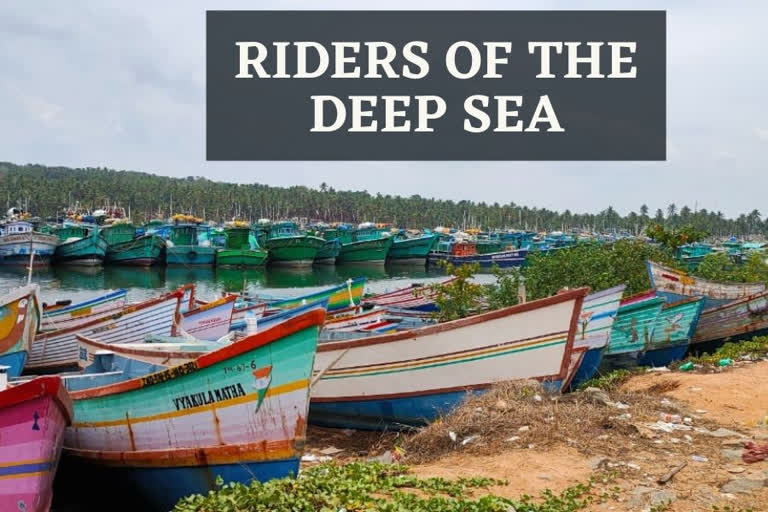Thoothoor (Tamil Nadu): Before the fishing was modernised under Indo-Norwegian pact in the 1970s, there existed various traditional fishing practices. There were proverbial seasoned fishermen in the coast who would predict the arrival of fish - including particular variety - by the very smell of the sea breeze or after tasting a scoop of seawater to sense the change in sea currents bringing fish.
With the modernization of the sector, the traditional wisdom of fishermen weaned out as the fishermen took to bigger crafts venturing deeper and deeper. But COVID-19 has made these deep-sea fishermen rehash one of their oldest fishing techniques during the lockdown.
The fishermen in this part of the region, the western coast of Kanyakumari bordering Kerala, are hailed as the daredevils of Tamil Nadu's fisher folk. Leaving aside their counterparts in the state to do fishing in the Indian waters, these fishermen hailing from Thoothoor panchayat venture anywhere beyond 1000 to 1500 nautical miles deep into the Indian Ocean for fishing.
The deep-sea fishermen have fine tuned their traditional navigation skills along with modern gadgets like GPS (Global Positioning System) to take out deep sea fishing expeditions lasting anywhere from 30 to 45 days. While most of the fishermen use trawl fishing in the state, these fishermen are experts in long line fishing catching mostly tuna and marlins in the deep sea.
The nationwide lockdown announced on March 24 caught them unaware as sizeable fisherfolk was deep inside the sea and found their fishing harbours wearing a deserted look while their buyers have disappeared into lockdown when they returned. Having sold their precious catch to a pittance, they are now confined to their coastal villages without much work.
Read: Global travel still up in air over virus: Dubai airport CEO
"Most of our fleet is moored at Thengapattinam fishing harbour and other harbours in Kerala. The lockdown has crippled our livelihood", said D Sharlin, a deep-sea fisherman owning a couple of boats. There are around 900 deep-sea fishing boats termed as 'Tuna Liners' from the seven villages of Thoothoor panchayat operating from fishing harbours like Thengapattinam in Tamil Nadu, Kochi, Munambam and Vizhinjam harbours in Kerala.
As many hands are idle at present, these deep-sea fishermen have turned into an ancient fishing technique of shore-netting.
Shore-netting is a fishing practice used in the fishing hamlets for ages. A huge net - a length of 500 to 800 meters - is spread in the sea near coast early in the morning. The fishermen gather in the shore after their breakfast and start pulling this huge net to the shore.
Singing old fisherfolk songs, the men, sometimes women too, start pulling the net to shore inch-by-inch in a synchronized manner. After almost three to four hours of back-breaking toil, the massive net comes to the shore with the haul and the catch is equally shared among all the hands. This practice is still in vogue in many parts of Tamil Nadu like Ramanathapuram district.
"It is an ancient technique, sort of left to the elderly people now while the youngsters and able-bodied venture into deep sea. We thought why not give a try again in shore-netting instead of sitting idle at home", said Sharlin.
Jose Bilbin, President of Deep Sea Fishermen Cooperative Society said that the government during the lockdown allows only small country boats to sail into the sea with a four-hour window. They are allowed to fish on Monday, Wednesday, Friday and Saturday in a week. The fish caught in the villages are to be sold in the villages and not allowed for transport.
"Deep-sea fleet employs most of the fishers while the country boats are not many like in the past. So our men are trying to use the old shore netting technique. But the fact is that there are not many shore-nets available too in the villages now", Bilbin added.



